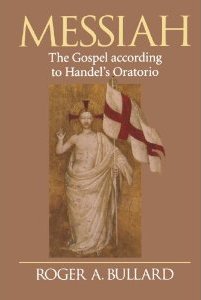| BOOKS |

|
| TITLE: |
MESSIAH:
THE
GOSPEL ACCORDING TO HANDEL'S
ORATORIO |
| AUTHOR: |
ROGER
A. BULLARD |
| PUBLISHER: |
WM.
B. EERDMAN'S PUBLISHING CO.
|
| ISBN
(HARDCOVER): |
N/A |
| ISBN (PAPERBACK): |
0802801250;
1579105661 |
| UPC/EAN: |
9780802801258 |
| LCCN: |
ML410.H13B88 |
| YEAR: |
1993 |
| SERIES: |
N/A |
| PAGES: |
160
P. |
| PUB.
LOCATION: |
GRAND
RAPIDS, MICHIGAN |
| DDC: |
782.23 |
| EXCERPT: |
CLICK HERE
FOR SAMPLE PAGE (.PDF) |
|
|
|
| DESCRIPTION:
Bullard provides an informed, readable
commentary specifically on the libretto, or
text, of Handel's Messiah, explaining each
part in terms of: how the language differs
from the King James Version of the Bible; what
the passage of Scripture meant in its original
context; and how the citation fits in the
artistic and religious structure of the
oratorio as a whole. |
SITE RATING: 7/10
SITE
REVIEW: There have
been several books which have dealt with Messiah
as an ecumenical document; that is, an
oratorio having meaning exclusively to
church-goers, and the libretto, having been
adapted freely from scripture and other
religous sources, can be "reverse engineered"
and treated exclusively as Christian Property.
There are numerous "devotional" books
which, using Messiah's libretto -
provide daily lessons for the
evangelistic sects. This site is not
going to review those heavily subjective
tomes. But Messiah: The
Gospel According To Handel's Oratorio,
by Roger Bullard, has value outside the
religous field, in particular for performers
who are approaching Messiahfor
the first time, or who wish to delve more
deeply into the meaning of the text.
Many performers make the mistake of
ignoring the power of Messiah's libretto in
favor of a myopic, music-only focus,
which is a mistake, since for many, the
music/libretto marriage is what has made Messiah
not only popular, but immortal. While
Bullard doesn't shy away from connecting the
scriptural sources to his own ideas of sacred
history, he more often applies his scriptural
and historical knowledge to the origins of the
libretto - the reasons why the scriptures and
passages chosen for Messiah were written, and
places them in context of how they inform the
oratorio as a whole. Performers I think will
find valuable lessons in why "Comfort Ye My
People" should be sung as an exultation of
joy; or how the author of the Hebrews
scripture quoted might have used Plato as a
templet for convicing people of the divinity
of Christ? There is much thoughtful
analysis evident throughout the book, and
although the author relies heavily upon
Christian tradition for some of his
conclusions, I found the book to be valuable
to the layman, novice, and experienced Messiah
enthusiast.
|
|

